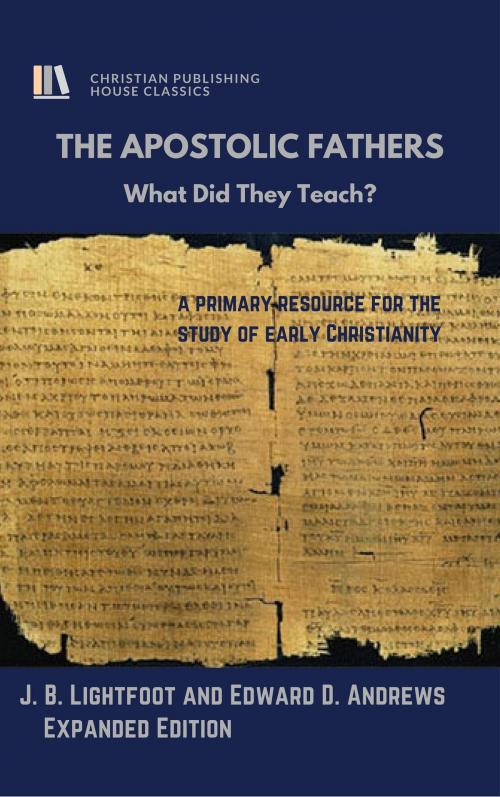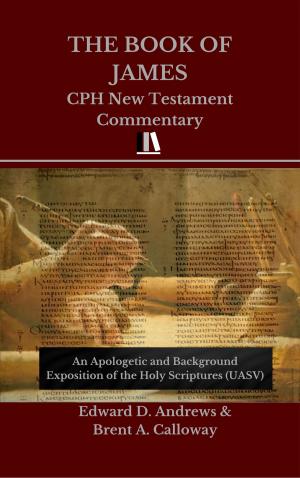THE APOSTOLIC FATHERS
What Did They Teach?
Nonfiction, Religion & Spirituality, Christianity, Evangelism, Church, Church History, Bible & Bible Studies, Study| Author: | Edward D. Andrews, J. B. Lightfoot | ISBN: | 1230001303162 |
| Publisher: | Christian Publishing House | Publication: | August 6, 2016 |
| Imprint: | Language: | English |
| Author: | Edward D. Andrews, J. B. Lightfoot |
| ISBN: | 1230001303162 |
| Publisher: | Christian Publishing House |
| Publication: | August 6, 2016 |
| Imprint: | |
| Language: | English |
The Apostolic Fathers are a small number of Early Christian authors who lived and wrote in the second half of the 1st century and the first half of the 2nd century. They are acknowledged as leaders in the early church, although their writings were not included in the New Testament. They include Clement of Rome, Ignatius of Antioch, Polycarp of Smyrna, the author of the Didache, and the author of the Shepherd of Hermas. The Apostolic Fathers, the earliest extant Christian writings outside the New Testament, are a primary resource for the study of early Christianity. These works are important because their authors were contemporaries of the biblical writers.
EARLY CHRISTIANITY IN THE FIRST CENTURY by Edward D. Andrews will give its readers a thrilling account of first-century Christianity. When and how did they come to be called Christians? Who are all obligated to be Christian evangelists? In what way did Jesus set the example for our evangelism? What is the Kingdom of God? What was their worship like and why were they called the truth and the Way? How did 120 disciples at Pentecost grow to over one million within 70-80-years? What was meant by their witnessing to the ends of the earth? How did Christianity in its infancy function to accomplish all it did? How was it structured?
How were the early Christians, not of the world? How were they affected by persecution? How were they not to love the world, in what sense? What divisions were there in the second and third centuries? Who were the Gnostics? These questions will be answered, as well as a short overview of the division that grew out of the second and third centuries, pre-reformation, the reformation, and a summary of Catholicism and Protestantism. Andrews closes out with why we should not lose hope over the fact there are over 41,000 varieties of Christianity today. He also addresses how we can know if we are in the right Christian denomination.
The Apostolic Fathers are a small number of Early Christian authors who lived and wrote in the second half of the 1st century and the first half of the 2nd century. They are acknowledged as leaders in the early church, although their writings were not included in the New Testament. They include Clement of Rome, Ignatius of Antioch, Polycarp of Smyrna, the author of the Didache, and the author of the Shepherd of Hermas. The Apostolic Fathers, the earliest extant Christian writings outside the New Testament, are a primary resource for the study of early Christianity. These works are important because their authors were contemporaries of the biblical writers.
EARLY CHRISTIANITY IN THE FIRST CENTURY by Edward D. Andrews will give its readers a thrilling account of first-century Christianity. When and how did they come to be called Christians? Who are all obligated to be Christian evangelists? In what way did Jesus set the example for our evangelism? What is the Kingdom of God? What was their worship like and why were they called the truth and the Way? How did 120 disciples at Pentecost grow to over one million within 70-80-years? What was meant by their witnessing to the ends of the earth? How did Christianity in its infancy function to accomplish all it did? How was it structured?
How were the early Christians, not of the world? How were they affected by persecution? How were they not to love the world, in what sense? What divisions were there in the second and third centuries? Who were the Gnostics? These questions will be answered, as well as a short overview of the division that grew out of the second and third centuries, pre-reformation, the reformation, and a summary of Catholicism and Protestantism. Andrews closes out with why we should not lose hope over the fact there are over 41,000 varieties of Christianity today. He also addresses how we can know if we are in the right Christian denomination.















